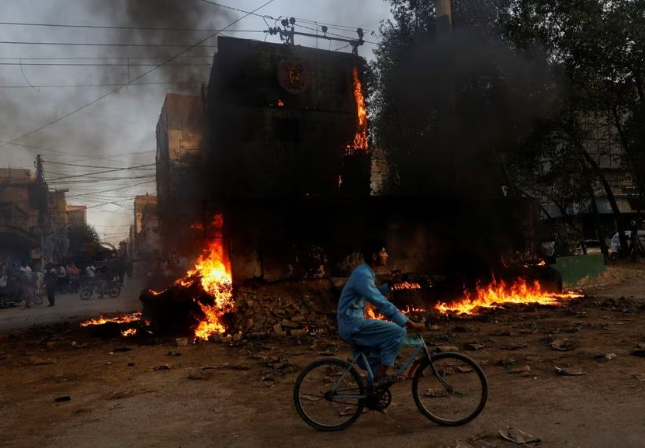As former prime minister Imran Khan was pushed, manhandled, and shoved into the back of a rangers vehicle and hurried away into the custody of the National Accountability Bureau (NAB), there was little doubt that all hell was about to break loose.
In a show of impressive street-power, Khan’s voter-base made their presence known all across the country targeting military cantonments as their protest-location of choice. This on its own is enough to tell us that the tussle in Pakistan is less between the PDM government and Imran Khan and more between the country’s military establishment and its people. While the validity of the case Khan has been taken into custody for is up for discussion, the timing of the arrest reeks of political victimisation. Only a few days ago he had once again named senior military officials as responsible for an assassination attempt against him.
But lost in the chaos of raging protests and internet outages was the very real threat of default that Pakistan faces. Only a few hours before Khan was violently arrested by a small battalion of rangers, ratings agency Moody’s had warned that Pakistan could default if an agreement with the International Monetary Fund (IMF) was not inked by the end of June.
As things stand, the hopes of an IMF deal are growing slimmer by the day. Pakistan has barely enough foreign reserves to cover imports for a few weeks. Already the tremors of Khan’s arrest are making themselves known. The rupee fell again compared to the dollar and gold prices shot up to another record high as the threat of default ballooned with the events of the day. With delayed elections, a controversial supreme court, historic public unhappiness with Pakistan’s military establishment, and a toothless federal government there are far too many reasons for the IMF to let Pakistan drown and almost none for them to sign an agreement with Pakistan. Already the fund in a recent statement has mentioned that Pakistan is not in their agenda.
Look at it this way. The former prime minister who commands popular support has been arrested in a corruption case. The incumbent prime minister is in London, extending his stay on the instruction of his brother and fighting a losing battle on twitter and in his own capital. The country is staring down the ravine of certain default, inflation is soaring high, unemployment is rampant, and the streets are full of rioters. It is, to put it mildly, a trainwreck. It is a dumpster fire. It is a trainwreck swirling around inside a dumpster fire crushing everything in its path and burning the few vestiges of a state that we have left.
So what will become of Pakistan’s long-delated IMF agreement? It is worth remembering that the first spanner was thrown into the works during Imran Khan’s own government when his administration’s finance team led by former finance minister Shaukat Tarin persisted with a foolish fuel subsidy and locked horns with the fund.
There was a brief moment of respite under Miftah Ismail’s brief tenure heading Q-block until the incumbent finance minister Ishaq Dar took over and apishly thumped his chest and said he had been dealing with the IMF for decades and knew how to handle them. After a few months of artificially keeping the dollar low, things came crashing down when Pakistan came painfully close to default in January. Since then, it has been a constant back and forth where the government has done everything to meet the IMF’s demands and has promised the SLA is only a few days away. That has been going on for over four months now. With the arrest of Khan, the ultimate losers are the people of Pakistan for whom the cost of living is only going to go up and now basic amenities such as petrol and electricity may be on the chopping block.
The decision to arrest Khan will have far reaching implications. For now it seems that the country is headed towards a meltdown. The scenes of protestors gathering outside the houses of corp commanders are unprecedented, and it is anyone’s guess how the establishment will react. What is becoming clear is that there is no benefit in the chaos, and a lot to be lost.

























Really Very Helpful For me Thanks…